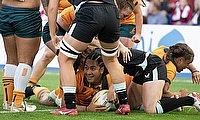Progressive Rugby’s Tim Stimpson calls for more clarity and consistency on new concussion rules
Former England full-back Tim Stimpson believes there needs to be more clarity and consistency around the new elite concussion protocols which have been recently introduced by World Rugby.
Earlier this week, the governing body announced that from July 1st, any elite player that suffers a brain injury is likely to be stood down for 12 days before being allowed to resume training.
This will apply to all players who have a history of concussions or who fail the Head Injury Assessment (HIA) during a game, but players who have a satisfactory concussion history and have also received approval from an independent concussion consultant could return to play after a minimum of seven days – often in time for the next weekend.
The changes do not affect the community game where players who sustain a brain injury must be stood down for 19 days, or 23 days in U19 rugby. There is no HIA in the community game and players believed to have sustained a concussion must be removed from play immediately.
The extension of the elite return-to-play protocols is something Stimpson - who is part of the lobby group Progressive Rugby – is in support of, but he feels, both in terms of safety and clarity, the 12-day stand-down should apply irrespective of a player’s concussion history.
Stimpson told TRU: “First of all, moving that return-to-play protocol out to 12 days is a significant step in the right direction and it will make the game a bit safer.
“During the last 16 months, Progressive Rugby have met several times with World Rugby who remained adamant that six days was safe so we are pleased they have finally changed their minds.
“It is up to World Rugby to do all it can to make the game as safe as possible, so rest assured, Progressive Rugby will continue to apply pressure if we don't feel these protocols are implemented, and players are not being properly protected.”
Stimpson, who won four Premiership titles and the Heineken Cup with Leicester Tigers, added: “I personally think there should be more clarity. If an elite player has received a brain injury, they should be stood down for 12 days both for their own safety but also for the positive message that sends the rugby community – that the game looks after its players.
“From an elite rugby player’s point of view, we are there to inspire, we are there to bring hope, but we are also there to set an example. Setting an example at the top would be a fantastic leap forward. We just need to make it very clear that if you have suffered a brain injury, then you should be encouraged to be looked after.”
The different criteria and lack of forcefulness is something which one of Stimpson’s peers at Progressive Rugby – Alix Popham – highlighted last year in an interview with TRU.
The former Wales international was discussing World Rugby’s guidance which recommended that teams should do a maximum of 15 minutes of full contact training a week across a maximum of two days, but Popham’s frustration was that this wasn’t a mandatory rule.
In English rugby’s Professional Rugby Injury Surveillance Project Report which was released on Tuesday, it revealed concussion statistics were the highest recorded since the report first began 20 years ago.
With this in mind, Stimpson feels it is vital for the sport to continue testing, researching and creating evidence if they are to improve player welfare whilst also protecting the core values of the sport.
“I remember at my time at Leicester, everyone knew that we did a load of bone on bone [training],” Stimpson adds.
“You need to do full-on contact. You have got to learn how to tackle under pressure, but it has got to be measured and therefore I would agree with Alix that maximums should be mandated. Players can work on so many skills outside of full contact - footwork drills, awareness drills, reaction drills etc - so I think the guidelines issued by World Rugby should be mandated to ensure compliance.
One way in which the exertions of players could be managed and research could be improved is through ‘smart’ mouthguards which the RFU will be offering to all Premiership, Allianz Premier 15s and England players next season.
The mouthguards have already been used by Harlequins, Bristol Bears Women and England’s Red Roses and the technology measures the frequency and magnitude of head contact and head accelerations.
The use of technology to help create evidence around brain injuries is becoming more common and Stimpson is in favour of anything which can move the game forward.
“Knowledge is power, isn't it?” he says. “Making sure that knowledge is shared for the greater good so we can start to educate everybody based on evidence.
“You are going to have people who believe differently, but we know already from research done using mouthguards, the number of 'sub-concussive' incidents - i.e. the number of times your brain rebounds around inside your skull in training or a game is significant and should be reduced where possible.
“We just have to keep the conversation going. I don't care whether you are male or female, I care about your safety so we need establish data to help us manage players safely.
“Some are uncomfortable with change, but the game needs to adapt to survive. It will remain intensely physical, it’s just a case of caring for the players appropriately as more evidence becomes available. We didn’t used to wear gumshields at all did we? We didn’t used to wear cricket helmets when we played cricket, but through time, research and technology, we can make the game safer.
“We are on a journey to make it as safe as we can, but at the same time, also future-proofing this great game so it can be enjoyed by future generations.”
Stimpson: I would love to be back playing again in that Leicester squad
Stimpson was speaking to TRU just days after his former club, Leicester Tigers, clinched their first Premiership title in nine years.
Freddie Burns’ dramatic drop goal with just 22 seconds remaining made sure the East Midlands outfit edged past Saracens to return to the summit of English rugby.
Stimpson, who won the Premiership in four successive years with the Tigers, was at Twickenham last Saturday as he watched his old club bring the trophy back to Mattioli Woods Welford Road.
“I actually went to the final with my kids and I celebrated like a true fan. I was screaming 'drop goal, drop goal!' My teenage boys were looking at me thinking, 'Dad's gone mad!'
“It was a whole squad effort. There might be five or six different guys coming in each week but it didn't matter what the name was. It was all about a renewed sense of understanding of what was expected of a Leicester team. I look around and if I was playing, how much I would love to be back in my 20s again playing in that squad.”
Stimpson credits the coaching methods of Steve Borthwick and the inspirational Kevin Sinfield for creating an environment and a Tigers team which is in unison both on and off the field.
It means he isn’t surprised to see six of Leicester’s newly crowned champions currently with England in Australia as they prepare for their upcoming three-Test series against the Wallabies. Title-winning skipper Ellis Genge is joined by Ollie Chessum, Joe Heyes, Guy Porter, Jack van Poortvliet and Freddie Steward.
Stimpson, who went on tour to the southern hemisphere during his international career, hopes the Tigers’ young contingent can continue to shine Down Under.
“I remember going off on these summer tours with England and it is dead exciting!" Stimpson says. “You will want to go and prove everything again. You've got that youthful ambition to try and get selected, but all the time you have got to learn the different gameplan.
“It is a short amount of time to sort of start reading each other. You haven't really got time to plan things at international level. For example, is Freddie Steward going to be able to pick out that fantastic support line off a player he doesn't play with week in, week out? That is the pressure of international rugby.
“You have got limited time so you are desperate to gel and to get an understanding but with so many players coming in and out, it is often difficult.
“The Aussies are resurgent as well. They are playing at home and it is not often you go down to Australia and win a series and I think England are up against it. They have got to start with the next training session and with the next match to try and build some momentum for English rugby.”








